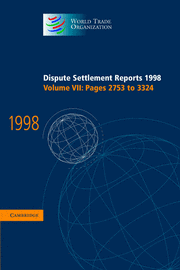United States - Import Prohibition of Certain Shrimp and Shrimp Products (WT/DS58): Report of the Panel
Published online by Cambridge University Press: 22 December 2017
Summary
INTRODUCTION
In a letter dated 8 October 1996, India, Malaysia, Pakistan and Thailand, acting jointly, requested consultations with the United States pursuant to Article 4 of the Understanding on Rules and Procedures Governing the Settlement of Disputes (“DSU”) and Article XXII:1 of the General Agreement on Tariffs and Trade 1994 (“GATT 1994”) regarding the ban imposed upon importation of certain shrimp and shrimp products from the respective countries by the United States under Section 609 of U.S. Public Law 101-162 (“Section 609”) and the “Revised Notice of Guidelines for Determining Comparability of Foreign Programs for the Protection of Turtles in Shrimp Trawl Fishing Operations”(WT/DS58/1). Consultations were held on 19 November 1996 without resulting in a satisfactory solution of the matter.
In a communication dated 9 January 1997, Malaysia and Thailand requested the Dispute Settlement Body (“DSB”) to establish a panel to examine, under Article XXIII:2 of GATT 1994 and Article 6 of the DSU, the partial embargo on the importation of certain shrimp and shrimp products implemented through a series of actions, including enactment of Section 609, promulgation of regulations and issuance of judicial decisions interpreting the law and regulations (WT/DS58/6). In a communication dated 30 January 1997, Pakistan made the same request to the DSB (WT/DS58/7). On 25 February 1997, the DSB established a panel pursuant to the request of Malaysia and Thailand. At the same meeting, the DSB established a panel in accordance with the request made by Pakistan. The DSB also agreed that the two panels would be consolidated into a single panel, pursuant to Article 9 of the DSU, with standard terms of reference (WT/DSB/M/29).
In a communication dated 25 February 1997, India requested the DSB to establish a panel pursuant to Article XXIII of GATT 1994 and 6 of the DSU (WT/DS58/8). At its meeting on 10 April 1997, the DSB established a panel in accordance with the request made by India. The DSB also agreed that this Panel would be consolidated with the Panel already established at the request of Malaysia, Thailand and Pakistan on 25 February 1997, pursuant to Article 9 of the DSU (WT/DSB/M/31).
- Type
- Chapter
- Information
- Dispute Settlement Reports 1998 , pp. 2821 - 3324Publisher: Cambridge University PressPrint publication year: 2001
- 15
- Cited by



